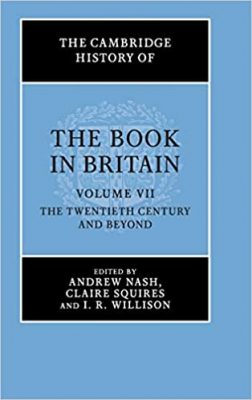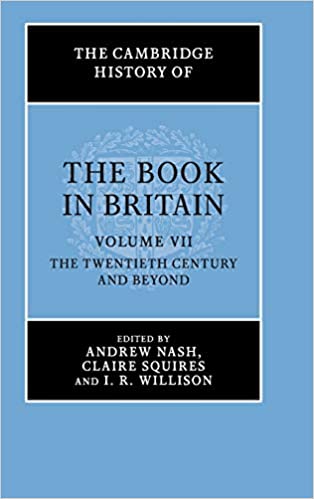 Editors: Andrew Nash, Claire Squires, and I.R. Willison
Editors: Andrew Nash, Claire Squires, and I.R. Willison
Publisher: Cambridge University Press – 766 pages
Book Review by: Sonu Chandiram
This book is an authoritative and broad survey as well as an in-depth analysis of some areas of the history of the book in the United Kingdom in the twentieth century. It is the final volume in a series of seven books. It is about authorship, bookselling, printing and publishing, as well as readership.
You will find valuable information about how knowledge of many aspects of human activities and lives in Britain was shared in the twentieth century and thereafter. It is about the ways and means that many forms of visual information was shared, such as about architecture, biology, commerce, design, engineering, finance, geography, history, ideas, literature, medicine, navigation, opera, politics, the Quran, radicalism, socialism, typesetting, universities, the Vatican, World Wars I and II, the Xerox machine, Yeats, and Zambia. And of course, much, much more
Thirty-one specialists in a wide range of subjects relating to book publishing from all around the United Kingdom, Ireland and Scotland authored or coauthored the 31 chapters of this book we list below:
Introduction
- Part I
- Materials, technologies, and the printing industry
- Format and design
- The digital book
- Part II
- Authorship
- Publishing
- Distribution and bookselling
- Readership and ownership
- Part III
- Literature
- Children’s books
- Schoolbooks and textbook publishing
- Popular science
- Popular history
- Religion
- Publishing for leisure
- Museum and art book publishing
- Music
- University presses and academic publishing
- Journals (STM and humanities)
- Information, reference and government publishing
- Maps, cartography, and geographical publishing
- Magazines and periodicals
- Comics and graphic novels
- Part IV
- The book in wartime
- Books, intellectual property and copyright
- Books and the mass market: class, democracy and value
- The book and civil society
- Sex, race and class: the radical, alternative and minority book trade in Britain
- Counter-culture and underground
- Books and other media
- Book events, book environments
- The book. British imperialism and post-imperialism
Bibliography
In this book, you will find discussions on a very wide range of subjects in book publishing in Britain – such as about the key market areas in which publishers competed, the evolution of technologies from the earliest forms of printing and distribution to the era of and impact of digital technologies in book publishing, and much, much more. We have provided the list of book chapters above to give you a very broad idea of what you will find in this book of over 750 pages.
The series of essays you will find by authors of different backgrounds on various topics of their expertise provide enlightening insights, perspectives, and viewpoints.
Editors:
Andrew Nash is Reader in Book History and Deputy Director of the Institute of English Studies at the University of London. In addition to books on Scottish and Victorian literature, he has edited or co-edited The Culture of Collected Editions (2003), Literary Cultures and the Material Book (2007), and New Directions in the History of The Novel(2014). He contributed essays to volume 6 of The Cambridge History of the Book in Britain and volume 4 of the Edinburgh History of the Book in Scotland. He is an editor of The Review of English Studies.
Claire Squires is Director of the Stirling Centre for International Publishing and Communication at the University of Stirling. Her research focuses on contemporary book cultures, including literary festivals and book prizes, editorial, marketing, and communication processes within publishing, and aspects of diversity and politics relating to book industries. Her publications include: Marketing Literature: The Making of Contemporary Writing in Britain (2007) and with Padmini Ray Murray, The Digital Publishing Communications Circuit (2013).
I.R. Willison held several senior posts in the British Museum Library from 1955 until his retirement in 1987. As Senior Research Fellow at the Institute of English Studies at the University of London, he played a leading part in the development of book history as a field in the English-speaking world. He edited volume 4 of The New Cambridge Bibliography of English Literature (1972) and has authored numerous essays on bibliography, book history and librarianship in Britain and in a global context. He was awarded the CBE (Commander of the Most Excellent Order of the British Empire) for services to the field in 2005. He is the Benefactor of the Willison Foundation Trust which was established in 2016 to promote the advancement of the history of the book in the humanities.







